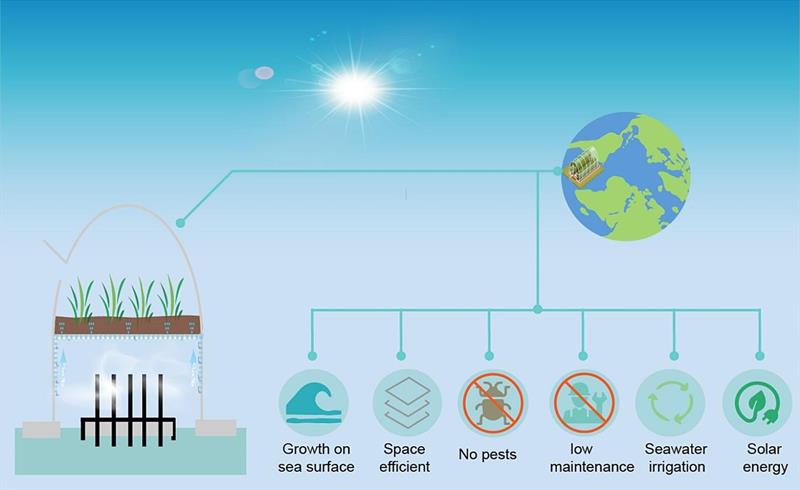
Floating sea farms: an ingenious solution to feed the world and ensure freshwater by 2050
by University of South Australia 15 Sep 2023 05:26 UTC

University of South Australia researchers have designed a self-sustaining solar-driven system © University of South Australia
The sun and the sea - both abundant and free - are being harnessed in a unique project to create vertical sea farms floating on the ocean that can produce fresh water for drinking and agriculture.
In what is believed to be a world first, University of South Australia researchers have designed a self-sustaining solar-driven system that evaporates seawater and recycles it into freshwater, growing crops without any human involvement.
It could help address looming global shortages of freshwater and food in the decades ahead, with the world's population expected to reach 10 billion by 2050.
Professor Haolan Xu and Dr Gary Owens from UniSA's Future Industries Institute have developed the vertical floating sea farm which is made up of two chambers: an upper layer similar to a glasshouse and a lower water harvest chamber.
"The system works much like a wicking bed that household gardeners might be familiar with," Dr Owen says.
"However, in this case, clean water is supplied by an array of solar evaporators that soak up the seawater, trap the salts in the evaporator body and, under the sun's rays, release clean water vapour into the air which is then condensed on water belts and transferred to the upper plant growth chamber."
In a field test, the researchers grew three common vegetable crops - broccoli, lettuce, and pak choi - on seawater surfaces without maintenance or additional clean water irrigation.
The system, which is powered only by solar light, has several advantages over other solar sea farm designs currently being trialled, according to Professor Xu.
"Other designs have installed evaporators inside the growth chamber which takes up valuable space that could otherwise be used for plant growth. Also, these systems are prone to overheating and crop death," Professor Xu says.
Floating farms, where traditional photovoltaic panels harvest electricity to power conventional desalination units, have also been proposed but these are energy intensive and costly to maintain.
"In our design, the vertical distribution of evaporator and growth chambers decreases the device's overall footprint, maximising the area for food production. It is fully automated, low cost, and extremely easy to operate, using only solar energy and seawater to produce clean water and grow crops."
Dr Owens says their design is only proof-of-concept at this stage, but the next step is to scale it up, using a small array of individual devices to increase plant production. Meeting larger food supply needs will mean increasing both the size and number of devices.
"It is not inconceivable that sometime in the future, you might see huge farm biodomes floating on the ocean, or multiple smaller devices deployed over a large sea area."
Their existing prototype is likely to be modified to produce a greater biomass output, including using low-cost substrate materials such as waste rice straw fibre, to make the device even cheaper to run.
The researchers have shown that the recycled water produced in this way is pure enough to drink and has less salinity than the World Health Guidelines for drinking water.
The United Nations estimates that by 2050, approximately 2.4 billion people are likely to experience water shortages. In the same period, global supply of water for agricultural irrigation is expected to decline by around 19%.
"Freshwater accounts for just 2.5% of the world's water and most of this is not accessible because it's trapped in glaciers, ice caps or is deep underground," Dr Owens says. "It's not that freshwater is dwindling either, but the small amount that exists is in ever increasing demand due to population growth and climate change.
"The fact that 97.5% of the world's water is in our oceans - and freely available - it is an obvious solution to harness the sea and sun to address growing global shortages of water, food, and agricultural land. Adopting this technology could improve the health and welfare of billions of people globally."
The design experiment is published in the Chemical Engineering Journal.